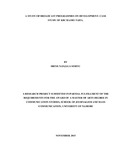| dc.description.abstract | The study seeks to investigate if broadcast programmes on development are given a priority in airplay, focusing on KBC Radio Taifa. The overall objective of the study is to find out how much airtime is allocated to development programming. The study was based on the programming schedule of Radio Taifa. The specific objectives of the study were; to find out how much of the radio airtime is dedicated to development journalism, establish challenges facing development journalism in the newsroom and to assess the impact of development journalism on the audience. This study has employed a qualitative research approach. The study used primary data which was collected through purposive sampling of Radio Taifa‘s programme schedule. It has also involved the use of face to face interviews, telephone interviews and self-administered questionnaires. The study used Technology Acceptance Model and Agenda Setting Theory. The study established that 33% of airtime was allocated to development programmes which is not enough as more time was allocated to entertainment which is of less importance to society; The study also found out that the need to increase development programmes was hindered by financial constraints, the need to beat deadlines, adhering to audience wishes and ownership objectives. The study therefore recommends that a more precise definition of development journalism should be put in place to avoid mischief where the media house airs larger percentages of content that does not readily address or solve the locals‘ problems; and dedicate lesser airtime for genuine development communication programmes for own interests. Also, Since programme production costs are high and business interests are at stake, there is need to facilitate production costs for the development journalism programmes so that interest parties may not swindle own interests in the otherwise noble course development journalism seeks to address. | en_US |

